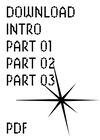User:Pedro Sá Couto/Graduate Research Seminar Trim 5/Introduction 10022020
From the XPUB PAD
https://pad.xpub.nl/p/psc_intro_01
Download pdf here↓
Introduction
The internet is now a more sophisticated multidisciplinary space that enables users to create content, communicate with one another, and even escape reality (Dentzel, 2014). The demand for new online spaces where users can frame extentions of themselves is increasing. We are susceptible to accept new tech, either by convenience or peer pressure. It is becoming compulsory to carry personal tracking devices like cellphones and smartwatches, and users agree with all the protocols that monitor them. The everyday netizen is compromising their identity because digital surveillance is normalized. Currently, as an example, citizens from Portugal don't need to carry an identity card anymore; the government created digital versions of them that can be stored on smartphones. There is the need to register to access libraries with personal cards, and once you are a member, you need these cards to photocopy archived material. A chain of power is created where it is almost mandatory to get digital, from passport checkpoints at the airport to exhaustively detailed residency permit requirements. Without acknowledging it, we are expanding our online footprints and becoming more responsible and easily accountable for digital imprints. Policies that affect the control over our data are more challenging to get a grasp of, and at the same pace, we are losing our ability to influence these decisions. The use of technology to surveil and control the conventional individual is expanding, making us more liable and, at the same time, vulnerable to these very organizations that are themselves converting into less responsible for the surveilled populace. (Mann, 2003)
While the awareness of digital surveillance is more popular and exists within a bigger audience, digital authoritarianism is impacting new forms of digital communication, violating fundamental human rights, such as the right to freedom of expression. For instance, albeit China is promoting the usage of technology to influence the growth of its industry, the Chinese Communist Party adapted and understood the power of the internet within their authoritarian regime and currently use it to maintain political stability. Even though censorship is not a new phenomenon; online censorship is more recent, making its impact more unpredictable. While governments use the control of the internet allegedly justified by protecting societal stability, this usage of web espionage has a cascading effect (Erixon and Lee-Makiyama, 2011).
I aim to explore the outcomes of strategies of online censorship within the contemporary panorama of digital surveillance. I aim to delve into the systems reinforced in the realm of publishing. The reality by now in academic publishing is universities and governments outsourcing the publishing of research papers to private companies such as JSTOR and Elsevier. These journals are maintained within paywalls that demand payment of approximately 30 euro per article, making access practically impossible to anyone who is outside institutions that have a paid subscription. In parallel, within book publishers, the same strategies are being reinforced, customers are forced to keep a file that they have paid for in airtight areas, such as their computers, iPads, or Kindles. More critical, these users are not able to transform these files into sharable ones.
A wide variety of infrastructures exist to publish files that have been made exclusive for a wide diversity of reasons, to hide/share governmental secrets, until copyrighted material. It is necessary to reflect not only in the creation of these places to share protected/copyrighted material but also to explore the required strategies to reach less informed audiences. While at the same time enabling this process to happen safely and anonymously. I aim to question how can publishing bypass surveillance. Concurrently, reflecting over the contemporary panorama where academic publishers build-up strategies such as watermarking to making their users more aware and liable for sharing digital files. At the same time, book publishers are reinforcing methods of Digital rights management (DRM) to prevent the distribution of unauthorized media restricting user actions. My questions focus on how is digital surveillance is influencing who gets to publish and how it is motivating the creation of reactive measures. I will provide insights into my creative response using Tactical Watermarks as an alternative form of anonymization, questioning authorship, and users' identity while appending messages that can subvert surveillance in physical and digital media.

